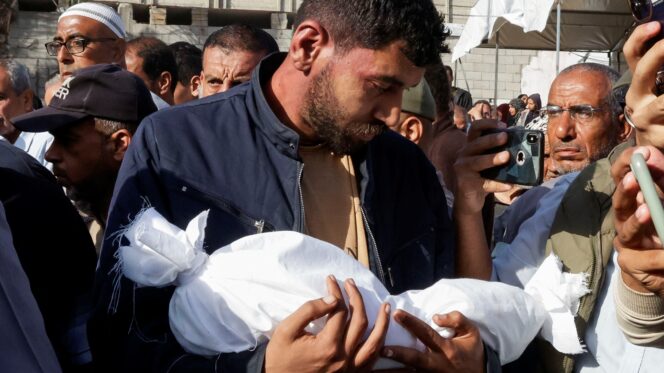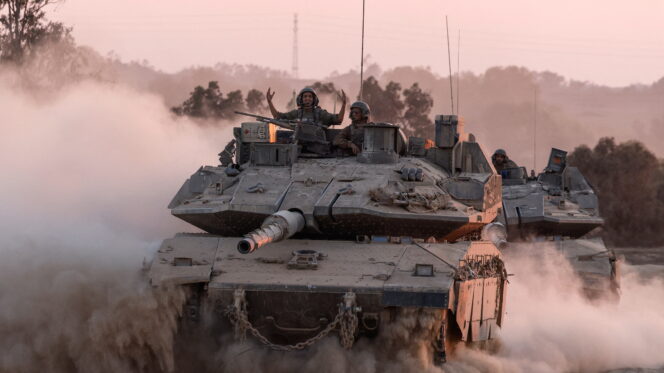Nakba Day 2025: We Existed Then, We Exist Now, We Will Continue to Exist
We are in the deadliest phase of Nakba.
by Selma Dabbagh
15 May 2025

No ads, no distractions – just quality journalism. Our supporters make this possible. Join them today and give one hour’s wage per month to back independent media
It didn’t start or end on 15 May 1948, but that is the date that encapsulates more than any other the terror, trauma and tragedy of the Palestinian experience. Now, in May 2025, as we commemorate the second Nakba Day whilst a genocide is being perpetrated by Israel in Gaza – with high tech murderousness on a wilfully starved Palestinian population of over two million men, women and (mainly) children – it may seem frustrating to have to go back to a date 77 years ago.
It can feel exasperating to have to re-explain what Palestinians have been explaining ad infinitum for years to every curious or hostile outsider they meet. Whether on a bus, a plane, at a dinner, to a hairdresser, in academic conferences; using reason, charm, wit, diplomacy, fury, knowledge; manifesting our voices in articles, on placards at demonstrations, in memes on social media, in UN reports, arguments in court, presentations on the stage, in poetry, art, prose. We existed then. We exist now. We will continue to exist. We are not savages. We form friendships. Keep our homes nicely. We have culture and community. We can speak multiple languages and are armed to the teeth with education.
Like all peoples, we have builders, nurses and bankers. We win awards. Oscars even. We paint and cook. Are leading installation artists and scientists. We have academics whose words and thoughts have left a lasting influence on the social sciences, comparative literature, sociology and history.
Palestinians are a nation of explainers of their own existence, whether they live under an apartheid regime in Israel, under occupation, in refugee camps or diaspora. They feel shame when in contact with outsiders if they can’t remember a detail about the injustice of the UN 1947 Partition Plan, agonise for days over not having evidenced an explanation enough, or for having let slip their emotions, or not spoken up. Palestinians know that every opportunity to discredit, to say that they do not exist or should not exist, will be grasped at. Those who live in relative physical safety feel their responsibility for those who do not. Those who do not, fear for their children.
These expert explainer efforts have not been without results. Each generation gives birth to a more refined, more adept generation of strategic influencers that can cross cultures and understand the mechanisms of power better than the last.
As the situation for Palestinians worsens and its political representation becomes more problematic, coopted, intolerant and targeted, our cause has become clearer, more vocal, better communicated. It lands. Palestine has given rise to mass protests from Dhakar to Detroit, university encampments from Glasgow to Rutgers.
But at what cost? The struggle of people against power, novelist Milan Kundera said, is the struggle of memory against forgetting. Our task – as of birth, as of conviction, as of necessity – is to continue reminding, restating, restoring a memory because the present and the future cannot be rectified without it.
The information has always been there, repeated and written about by Palestinians and their allies. There was an option for those who did not know before, to listen and act sooner, to have prevented this. To have recognised the supremacist racist vocabulary for what it was. To have called it out. To have refused to make exceptions.
I will now parcel history into a nugget: the Nakba commemorates the date the country of Palestine was stolen from the people who had, for generations, farmed its lands, lived in its houses and celebrated its festivities. Palestine was multifaith, with a haphazard governance under the Ottoman empire; a system which one early British traveller Marmaduke Pickthall described Palestinians as not minding; for them the way to evaluate the value of central governance was that the less one had of it, the better. At the turn of the last century, its state of ‘development’ was probably akin to that of other Mediterranean countries – not dissimilar to, say, Greece.
In 1900, Zionists were considered a minority to most of the global Jewish population – if they heard of the political movement at all. Its founder Theodor Herzl was a failed playwright radicalised by observing the antisemitism exposed by the Dreyfus trial in Paris. From the earliest of years of Zionism, upon discovering that the land of Palestine (one geographical option considered for Jewish settlement) was heavily populated, a faction decided that to solve this flaw in the supposedly terra nullius plan they would transfer the existing (Palestinian Arab) population out forcibly. Nur Masalha is a good source on this.
In 1917, the Jewish population was less than 10% of the population of Mandate Palestine, and Jewish land ownership by 1948 was less than 7% of the total land mass. The Nakba of 1948 was a military push for more land, fewer people by armed Zionist groups. The formula ‘more people of one religion and less of the others, while taking their land’ is one that repeats and mutates using different methods, from the legal to the brutal, to achieve these ends of eviction and theft. It is the process of nakba, an ongoing catastrophe.
Conservative estimates are that at least 700,000 Palestinians were terrified into leaving in 1948. They were never allowed to return to their homes, lands, views, beaches, hilltops, wells, livelihoods, livestock, families, friends, bank accounts, pets, furniture, park benches, paintings, book collections, libraries, mosques, churches, photographs, phonographs etcetera. The Nakba of 1948 has never been rectified, reversed or compensated for in any meaningful way. In fact, the converse: Palestinians have been punished for their plight repeatedly. Not just by the Israeli state, but by others, who have closed down on Palestinians ability to organise, to speak, to educate themselves, to work, or to settle, to reside legally in another place and to make roots.
By the way that I write, you will be able to deduce that I am opposed to the Zionist Project as a racist endeavour, but even by spelling that out, I feel myself stumbling over a trip wire of prohibitions on the language that allows us to oppose or criticise the most evil of deeds, the most brutal of occupations, the most vulgar, racist and bloodthirsty of politicians, the most well-equipped and performatively sadistic of armies.
I do not live under it, but Israel’s 2011 Nakba Law penalises the commemoration of the Nakba. It carries prohibitions similar to those found in definitions of antisemitism that legislate against criticism of Israel and conflate antisemitism (which is abhorrent as a form of ethno-religious prejudice) with anti-Zionism (which is criticism of a political belief system). If you want free speech, you have to be prepared to be disgusted and offended, but these Israel-protectionist provisions bleed censoriously into media editors’ lexicons and university curricula across the West. They chill beyond their reach.
I understand that some historians consider the term ‘Nakba’ with its tragic, fatalistic overtones, to be a bit of a misnomer. It was not a ‘catastrophe’ (the direct translation of the Arabic term) that happened in 1948, but a lavishly bankrolled politico-military campaign that was staunchly countered by Palestinians from the get-go.
Appeasement of the Nazis in 1938 enabled more British troops (20,000) to be stationed on that tiny strip of land than to any other part of the great pink Empire that accounted for a third of the world. Palestinians were systematically disarmed by the British under the Mandate. Villagers could be shot for hiding bullets in their teapots. Arthur (aka ‘Bomber’) Harris lobbied for, and was permitted to use, planes to bomb the villages that were hostile to British rule.
Despite the odds against them, the Palestinian anti-colonial resistance movement of 1936-39 with the fellahin (peasantry) as its backbone, regained swathes of Palestinian territory under its control – including many towns. Their demands were simple: “no taxes without representation” being the main cry for justice. This was countered with British military rule in all of the guises Israel uses against Palestinians today: curfews, checkpoints, house sealings and demolitions, administrative detention, torture, executions, deportation of leadership and so on. Same rules, same laws.
In Israel, the level of brutality against Palestinians correlates with the contorted logic and hard-wired racism shown by its legal system. It is a legal system designed for privileged settlers, not indigenous natives. True to form, the Israeli Supreme Court recently decreed that it was absolutely fine to prohibit humanitarian aid into Gaza.
My grandfather’s family was well established in Jaffa. He became a part of a resistance movement and was imprisoned several times by the British. He was in prison when my father was born. Aged ten, my father became the victim of the terror campaigns of Zionist gangs – the Irgun and the Stern. My father was with a group of kids when a grenade targeted them from above.
I have written about this elsewhere and he is writing about this now, so I am skating over the story that has become the emotional fabric of my life. My father thought he had been killed. He was nearly killed. The family were told he had been killed. The family left with him on a stretcher. It was mayhem. It was terrifying.
The deadliest phase of this ongoing Nakba is being perpetrated now in Gaza. As I write it can feel that there are no words, no ways, no means of doing anything that feels effective enough. With each killing, each image, every devastation, psychic wounds are inflicted with the physical ones, memories are resurfaced and re-lived. Studies on trauma describe processes of depersonalisation and dissociation, which can be defensive measures to protect us from the horror, but we cannot normalise this genocide.
The consequences of not listening or acting to stop what is happening will not just impact those with Palestinian convictions, of that I am certain. We cannot allow this to be a rehearsal for the future. The fight is not just for distant lives – urgent, individual, complex minds and lives – but for humanity globally.
Selma Dabbagh is a British-Palestinian writer and lawyer.


